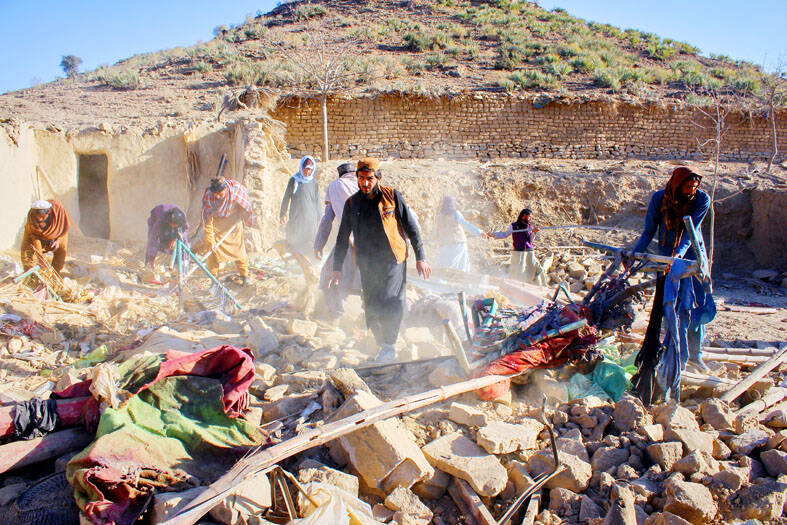Afghanistan’s Taliban government yesterday vowed to “respond appropriately” to overnight border strikes that killed 10 people it blamed on Pakistan, as tensions soar following a suicide bombing in Peshawar a day earlier.
“The Pakistani invading forces bombed the house of a local civilian resident,” Taliban spokesman Zabihullah Mujahid said on social media. “As a result, nine children [five boys and four girls] and one woman were martyred” in Khost Province.
Airstrikes targeting the border regions of Kunar and Paktika wounded another four civilians, he added.

Photo: AP
The raids were carried out by drones and other aircraft, said Mustaghfir Gurbuz, a spokesman for the governor of Khost.
In Jige Mughalgai, near the Pakistan frontier, a correspondent saw residents searching through the rubble of a collapsed house and preparing graves for victims.
“The Islamic Emirate strongly condemns this violation and reiterates that defending its airspace, territory and people is its legitimate right, and it will respond appropriately at the right time,” Mujahid said in a separate statement.
The Pakistani military did not comment on the strikes when contacted.
The bombardment follows a suicide attack on Monday that targeted the headquarters of Pakistan’s Federal Constabulary force in Peshawar, killing three officers and wounding 11 others.
No group has claimed responsibility, but state broadcaster PTV reported the attackers were Afghan nationals and Pakistani President Asif Zardari blamed the “foreign-backed Fitna al-Khawarij” — Islamabad’s term for the Tehreek-e-Taliban Pakistan (TTP) militants it accuses of operating from Afghan soil.
Another suicide blast outside a court in the Pakistan capital, Islamabad, this month killed 12 people and was claimed by a faction of the TTP, which shares the same ideology as the Afghan Taliban.
Islamabad blamed a militant cell which was “guided at every step by the ... high command based in Afghanistan” for the capital attack.
Pakistani Minister of Information and Broadcasting Attaullah Tarar held a news conference yesterday focused on the Islamabad attack.
He broadcast a video confession from one of the four suspects in custody, and said: “There is clear-cut evidence that TTA [Afghan Taliban] and TTP did it together, and the suicide bomber was a resident of Afghanistan.”
“Afghanistan is fully involved ... and their soil is also involved. The people being sheltered there are also involved,” he added on live television, without mentioning the strikes in the neighboring nation.
Relations between Islamabad and Kabul have been fraught since the Taliban swept back to power in 2021, and worsened after deadly border clashes last month that killed about 70 people on both sides.
The fighting ended with a ceasefire brokered by Qatar and Turkey, but several rounds of talks in Doha and Istanbul failed to produce a lasting deal, with security issues, especially Pakistan’s demand that Kabul curb TTP fighters, proving a sticking point.
Islamabad accuses the Taliban of sheltering militants behind a surge in attacks, including the TTP, which has waged a bloody campaign against Pakistan for years. Kabul denies the charge.

Right-wing political scientist Laura Fernandez on Sunday won Costa Rica’s presidential election by a landslide, after promising to crack down on rising violence linked to the cocaine trade. Fernandez’s nearest rival, economist Alvaro Ramos, conceded defeat as results showed the ruling party far exceeding the threshold of 40 percent needed to avoid a runoff. With 94 percent of polling stations counted, the political heir of outgoing Costa Rican President Rodrigo Chaves had captured 48.3 percent of the vote compared with Ramos’ 33.4 percent, the Supreme Electoral Tribunal said. As soon as the first results were announced, members of Fernandez’s Sovereign People’s Party

MORE RESPONSIBILITY: Draftees would be expected to fight alongside professional soldiers, likely requiring the transformation of some training brigades into combat units The armed forces are to start incorporating new conscripts into combined arms brigades this year to enhance combat readiness, the Executive Yuan’s latest policy report said. The new policy would affect Taiwanese men entering the military for their compulsory service, which was extended to one year under reforms by then-president Tsai Ing-wen (蔡英文) in 2022. The conscripts would be trained to operate machine guns, uncrewed aerial vehicles, anti-tank guided missile launchers and Stinger air defense systems, the report said, adding that the basic training would be lengthened to eight weeks. After basic training, conscripts would be sorted into infantry battalions that would take

EMERGING FIELDS: The Chinese president said that the two countries would explore cooperation in green technology, the digital economy and artificial intelligence Chinese President Xi Jinping (習近平) yesterday called for an “equal and orderly multipolar world” in the face of “unilateral bullying,” in an apparent jab at the US. Xi was speaking during talks in Beijing with Uruguayan President Yamandu Orsi, the first South American leader to visit China since US special forces captured then-Venezuelan president Nicolas Maduro last month — an operation that Beijing condemned as a violation of sovereignty. Orsi follows a slew of leaders to have visited China seeking to boost ties with the world’s second-largest economy to hedge against US President Donald Trump’s increasingly unpredictable administration. “The international situation is fraught

GROWING AMBITIONS: The scale and tempo of the operations show that the Strait has become the core theater for China to expand its security interests, the report said Chinese military aircraft incursions around Taiwan have surged nearly 15-fold over the past five years, according to a report released yesterday by the Democratic Progressive Party’s (DPP) Department of China Affairs. Sorties in the Taiwan Strait were previously irregular, totaling 380 in 2020, but have since evolved into routine operations, the report showed. “This demonstrates that the Taiwan Strait has become both the starting point and testing ground for Beijing’s expansionist ambitions,” it said. Driven by military expansionism, China is systematically pursuing actions aimed at altering the regional “status quo,” the department said, adding that Taiwan represents the most critical link in China’s